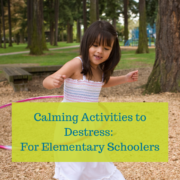Screen-Free Week: Getting Old-School at School
What began as a challenge to turn off the television for one week in 1994 is now a somewhat controversial test of willpower that takes place the first week in May. Originally initiated by the Campaign for a Commercial-free Childhood, Screen-Free Week has proven to be a far more difficult challenge for today’s tech savvy youth.
But let’s be honest, it’s not just adolescents and teens who are self-proclaimed “screen addicts”—we adults are just as hooked to our devices. While those opposed to the idea of Screen-Free Week argue that it polarizes traditional notions of creativity and new technology, others embrace the idea of ditching screen-time for a few days.
Seeing as public education has more or less embraced the use of technology in the classroom, it can even be difficult to separate educators from our beloved screens. Yet, trying as it may be to unplug, old school methods can still serve a purpose in our new-age classrooms. While students may groan in aggravation or roll their eyes in boredom at the thought of abandoning classroom technology for a week, there is much to be said about the “traditional” roots of education.
Here are a few ideas and activities that may seem old-school, but which provide truly beneficial skills that may have been left by the wayside in favor of our 21st century ideas of teaching and learning.
Have students thumb through an actual dictionary
Gasp! A what?! A recent trend that I’ve noticed in the classroom is the total lack of familiarity when it comes to a tangible dictionary. Of course, students are well-versed in online tools such as Merriam-Webster.com, which is an obviously speedier method of spelling and defining words. However, a physical dictionary forces students to practice old-school methods such as sounding out words, identifying alphabetical order, and skimming.
When students are required to search a dictionary, however infrequently, a common response that always elicits a chuckle is, “That word is not in the dictionary.” I once had a 13 year-old tell me that “unusual” was not in the dictionary. When we returned to his desk, his dictionary was opened to “unn”—a clear indication that he would’ve struggled for a while to find the word. Students are so used to instantaneous responses via the click of a keyboard that they are incapable of doing the actual leg-work when necessary. Simple practice with a dictionary can help students brush up on skills involving spelling, putting words in alphabetical order, identifying parts of speech, pinpointing synonyms, etc.
Break out the flashcards
Much like the dictionary dilemma, students may have become somewhat dependent on calculators to solve simple multiplication or division problems. Again, this is not always problematic—many higher-level math courses and math or science-related careers necessitate the use of a calculator. It is, however, problematic if students become reliant on on a calculator for every little problem. Research has proven that, even with the rise of new math curriculum methods, rote memorization of multiplication facts is still the most advantageous method.
Logically speaking, whipping out the calculator to calculate the number of packs of burger buns to buy for a barbeque may take longer than if you simply used your times tables and mental math. No harm will come of leaving the calculators aside for a week—it could, however, help to solidify the long-forgotten times tables!
Proofread > Spellcheck
Another convenience (crutch) that many students have fallen back on is the use of spellcheck. I cannot pass judgment—as I write this sentence, I am utilizing spellcheck in the hopes that it catches anything I’ve mistyped. Just as my students do, I allow myself to trust in the fact that my mistakes will not only be identified, but corrected with the click of a button. The notorious red squiggle, as helpful as it can be, creates an unrealistic safety net. As we well know, spellcheck is not flawless, especially when it comes to reading the context of the sentences.
Shutting down the word documents and practicing the art of proofreading or peer editing on paper is a worthwhile skill that requires no screen at all. Besides the obvious skill of penmanship, handwritten work allows students to rely solely on their own mastery of the English language. When there is no spellcheck or autocorrect to fall back on, drafting, brainstorming, and editing become imperative to the writing process.
Educators may be surprised by just how well old-school methods can supplement our new technology in the classroom. Even if just for a week, abandonment of the screens may teach students to effectively hone and rely on their own knowledge and skills.







